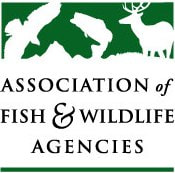PLENARY I: Relationship Conservation Across Borders and with First Nation Communities
Monday, September 25, 2023 | 8:00am-9:45am
This Plenary Session will be an opportunity to acknowledge that this is the first time that the Association of Fish and Wildlife Agencies has brought its Annual Meeting to Canada in 35 years and to thank the Province of Alberta for making this meeting a reality. Curt Melcher, President of the Association of Fish and Wildlife Agencies, and Director of the Oregon Department of Fish and Wildlife, and Todd Loewen, Minister of the Alberta Forestry and Parks will remind us of the importance of coordination and collaboration for a broad suite of species and ecosystems across a shared international border.
This session will also affirm the importance of First Nations as stewards of fish and wildlife resources in Canada and the importance of Reconciliation, a formal commitment to restoring meaningful and respectful relationships with First Nations and Indigenous communities. Dr. Leroy Little Bear, a professor at the University of Lethbridge, founding member of Canada’s first Native American Studies Department and member of the Blackfoot Confederacy from Kainai First Nation will offer historical and traditional insights into the indigenous community’s relationship with nature and the land. Dr. Little Bear will speak to the impacts of the Anthropocene on the ecological role of the fish and the buffalo.
This session will also affirm the importance of First Nations as stewards of fish and wildlife resources in Canada and the importance of Reconciliation, a formal commitment to restoring meaningful and respectful relationships with First Nations and Indigenous communities. Dr. Leroy Little Bear, a professor at the University of Lethbridge, founding member of Canada’s first Native American Studies Department and member of the Blackfoot Confederacy from Kainai First Nation will offer historical and traditional insights into the indigenous community’s relationship with nature and the land. Dr. Little Bear will speak to the impacts of the Anthropocene on the ecological role of the fish and the buffalo.
ABOUT THE PLENARY I PRESENTERS
Curt Melcher, Co-Chair, Oregon Department of Fisheries & Wildlife

Curt Melcher is a native Oregonian, who graduated from the University of Oregon with a B.S. degree in Biology.
He began his career with the Oregon Department of Fish and Wildlife as a temporary employee in 1985. During his time at the Department, he has represented the State of Oregon in numerous regional management forums, including the Pacific Fishery Management Council, Klamath Fishery Management Council, and Pacific Salmon Commission Southern Panel.
Curt served as the Deputy Director for Fish and Wildlife programs from 2007 through 2014 and was appointed the Interim Director in September 2014. He was hired as permanent Director in February 2015 and is currently the President of the Association of Fish and Wildlife Agencies.
Curt is passionate about the conservation of Oregon's natural resources and is an avid hunter and angler.
He began his career with the Oregon Department of Fish and Wildlife as a temporary employee in 1985. During his time at the Department, he has represented the State of Oregon in numerous regional management forums, including the Pacific Fishery Management Council, Klamath Fishery Management Council, and Pacific Salmon Commission Southern Panel.
Curt served as the Deputy Director for Fish and Wildlife programs from 2007 through 2014 and was appointed the Interim Director in September 2014. He was hired as permanent Director in February 2015 and is currently the President of the Association of Fish and Wildlife Agencies.
Curt is passionate about the conservation of Oregon's natural resources and is an avid hunter and angler.
Todd Loewen, Minister, Alberta Forestry and Parks

Honourable Todd Loewen became the Minister of Forestry, Parks and Tourism in the fall of 2022. After the Alberta provincial election in May 2023, Minister Loewen was asked to become the new Minister of Forestry and Parks. Minister Loewen was first elected in 2015, in electoral district of Grande Prairie-Smoky. He was born and raised in rural Alberta, where he still resides with his family near Valleyview, Alberta. His passion is the outdoors including hunting, fishing and trapping. Fun facts, he has been a taxidermist for almost 40 years and outfitting for 15 years.
Dr. Leroy Little Bear, Small Robes Band of the Blood Indian Tribe, University of Lethbridge
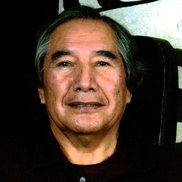
Dr. Leroy Little Bear is a member of the Small Robes Band of the Blood Indian Tribe of the Blackfoot Confederacy; born and raised on the Blood Indian Reserve; attended and graduated from St. Mary's School on the Blood Indian Reserve; attended and graduated from the University of Lethbridge, Lethbridge, Alberta with a B.A. Degree in 1971; attended and graduated from the College of Law, University of Utah, Salt Lake City, Utah with a Juris Doctor Degree in 1975. From 1975 to the end of 1996, Mr. Little Bear was a professor in the Native American Studies Dept. at the University of Lethbridge. In January of 1997, Mr. Little Bear retired from the University of Lethbridge. From January 1998 to June 1999, Mr. Little Bear was the Director of the Harvard University Native American Program.
Mr. Little Bear has served in a legal and consultant capacity to many Indian Tribes, and organizations including the Blood Tribe, Indian Association of Alberta, and the Assembly of First Nations of Canada. He has served on many different committees, commissions, and boards including the Task Force on the Criminal Justice and Its Impact on the Indian and Metis Peoples of Alberta in 1990-91. Mr. Little Bear has authored many articles including "A concept of Native Title" which has been cited in a Canadian Supreme Court decision. He has co-authored books including "Pathways to Self-Determination", "Quest For Justice", and "Governments in Conflict" with Dr. Menno Boldt and Dr. Anthony Long.
In 2003, Mr. Little Bear was the recipient of a Canadian National Aboriginal Achievement Award in Education. In June of 2004, Mr. Little Bear was the recipient of an honorary doctorate degree in Arts and Science from the University of Lethbridge and the University of Northern British Columbia in 2016. Mr. Little Bear received the Alberta Order of Excellence in 2016, and most recently was made an Officer of the Order of Canada in 2018. Presently, Mr. Little Bear is a Vice Provost for Indigenous Relations at the University of Lethbridge. Mr. Little Bear, with his wife, Amethyst First Rider, were major movers of the historic Buffalo Treaty signed by First Nations on both sides of the USA-Canada border. Both dedicate a large amount of their time to buffalo restoration
Mr. Little Bear has served in a legal and consultant capacity to many Indian Tribes, and organizations including the Blood Tribe, Indian Association of Alberta, and the Assembly of First Nations of Canada. He has served on many different committees, commissions, and boards including the Task Force on the Criminal Justice and Its Impact on the Indian and Metis Peoples of Alberta in 1990-91. Mr. Little Bear has authored many articles including "A concept of Native Title" which has been cited in a Canadian Supreme Court decision. He has co-authored books including "Pathways to Self-Determination", "Quest For Justice", and "Governments in Conflict" with Dr. Menno Boldt and Dr. Anthony Long.
In 2003, Mr. Little Bear was the recipient of a Canadian National Aboriginal Achievement Award in Education. In June of 2004, Mr. Little Bear was the recipient of an honorary doctorate degree in Arts and Science from the University of Lethbridge and the University of Northern British Columbia in 2016. Mr. Little Bear received the Alberta Order of Excellence in 2016, and most recently was made an Officer of the Order of Canada in 2018. Presently, Mr. Little Bear is a Vice Provost for Indigenous Relations at the University of Lethbridge. Mr. Little Bear, with his wife, Amethyst First Rider, were major movers of the historic Buffalo Treaty signed by First Nations on both sides of the USA-Canada border. Both dedicate a large amount of their time to buffalo restoration
Emcee: Travis Ripley, Executive Director, Regulatory Programs Branch, Government of Alberta
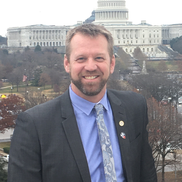
Prior to his role as Executive Director, Regulatory Programs in Alberta Environment and Parks, Travis was the Executive Director of the Fish and Wildlife Stewardship Branch for the Province of Alberta from 2010 - 2022. During this period, Travis led the provincial fisheries program and eventually taking on the role leading the provincial fish and wildlife management program. Growing up in southern Alberta and spending most of his time in the mountains appreciating nature and enjoying the fishing, Travis knew he had to focus on pursuing a career in the fish and wildlife field. He completed his Bachelor Degree at the University of Lethbridge in Environmental Science followed by his Master of Science degree in Ecology at the University of Alberta.
Travis has played an integral role in national and international forums including the Canadian Wildlife Directors, Canadian Council of Fisheries and Aquaculture as well as the Canadian ex-officio representative at the Association of Fish and Wildlife Agencies. Travis recently left the Alberta fish and wildlife branch after 26 years.
Travis has played an integral role in national and international forums including the Canadian Wildlife Directors, Canadian Council of Fisheries and Aquaculture as well as the Canadian ex-officio representative at the Association of Fish and Wildlife Agencies. Travis recently left the Alberta fish and wildlife branch after 26 years.
PLENARY II: Two Acts or Not to Act – Is That Really the Question?
Tuesday, September 26, 2023 | 8:00am-9:45am
The second plenary will recognize the 50th anniversary of the Endangered Species Act (ESA) in the United States and provide a reflection on twenty years of Canada’s Species at Risk Act (SARA). The plenary will begin with two keynote speakers: Ms. Martha Williams, Director of the U.S. Fish and Wildlife Service, and Dr. Justina Ray, President and Senior Scientist of Wildlife Conservation Society Canada. They will explore the history, success, and possible future of the ESA and SARA. The ESA/SARA connection will be explored from the perspectives of trans-border conservation opportunities and initiatives for at risk/endangered species -- what works and what doesn’t for both countries and their legislation and implications for listed species.
ABOUT THE PLENARY II PRESENTERS
Dr. Justina Ray, President and Senior Scientist, Wildlife Conservation Society Canada

Dr. Justina Ray has been President and Senior Scientist of Wildlife Conservation Society Canada since its incorporation in 2004. In addition to overseeing the operations of this non-governmental organization, Justina is involved in research and policy activities associated with conservation-based planning, impact assessment and biodiversity conservation, with a particular focus on mammals in northern boreal landscapes. She has been appointed to numerous government advisory panels related to species at risk and land use planning in Ontario and Canada and served as co-chair of the Terrestrial Mammals Subcommittee of the Committee on the Status of Endangered Wildlife in Canada (COSEWIC) between 2009-2017. Justina is Adjunct Professor at the University of Toronto (Department of Ecology and Evolution; Graduate Department of Forestry) and Trent University (Environmental & Life Sciences Graduate Program).
Director Martha Williams, U.S. Fish and Wildlife Service
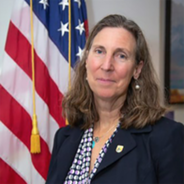
Prior to her appointment, Martha served as the Director of the Montana Department of Fish, Wildlife and Parks from 2017 to 2020. Previously, Martha was an Assistant Professor of Law at the Blewett School of Law at the University of Montana in Missoula, Montana where she co-directed the university’s Land Use and Natural Resources Clinic.
Martha returns to Interior after serving as Deputy Solicitor for Parks and Wildlife between 2011 and 2013, providing counsel to the National Park Service and the Fish and Wildlife Service. Growing up on a farm in Maryland, Martha gained an appreciation for open lands, waters, wildlife, and people. She earned a bachelor’s degree from the University of Virginia and a Juris Doctor degree from the University of Montana School of Law.
Martha returns to Interior after serving as Deputy Solicitor for Parks and Wildlife between 2011 and 2013, providing counsel to the National Park Service and the Fish and Wildlife Service. Growing up on a farm in Maryland, Martha gained an appreciation for open lands, waters, wildlife, and people. She earned a bachelor’s degree from the University of Virginia and a Juris Doctor degree from the University of Montana School of Law.
Moderator: Lowell E. Baier, Author / Conservationist / Historian / Attorney

Lowell E. Baier is an attorney as well as a legal and environmental historian and author. He has worked in Washington, D.C., throughout his 60-year career as a tireless advocate for natural resources and wildlife conservation. He holds five doctorates. Baier was recognized as the Conservationist of the year by the National Fish and Wildlife Foundation in 2008, by Outdoor Life Magazine in 2010, and by the Association of Fish and Wildlife Agencies in 2013. In 2016, the National Wildlife Federation awarded him their highest honor, the Jay N. “Ding” Darling Conservation Award for a lifetime of conservation service. He is the author of numerous books, including Inside the Equal Access to Justice Act: Environmental Litigation and the Crippling Battle over America’s Lands, Endangered Species, and Critical Habitats; Saving Species on Private Lands: Unlocking Incentives to Conserve Wildlife and Their Habitats; Federalism, Preemption, and the Nationalization of American Wildlife Management: The Dynamic Balance Between State and Federal Authority; The Codex of the Endangered Species Act, Volume I: The First Fifty Years; and The Codex of the Endangered Species Act, Volume II; The Next Fifty Years. Baier lives in Bethesda, Maryland.
PANEL DISCUSSION
Three panelists will present on and discuss species that have cross-border conservation needs. The three selected species are: bull trout, sage grouse, and the monarch butterfly. Each panelist will address the conservation status of the species, unique listing issues, recovery planning, and the impact since listing or future needs for the species. A session moderator will engage the speakers and the audience in a discussion about the effectiveness of the legislation in both countries for the three species.
PANEL DISCUSSION PRESENTATIONS & PRESENTERS
Silvia D’Amelio, Executive Officer, Trout Unlimited Canada
Reeling in Hope: Bull Trout Conservation and Recovery

As a prominent conservationist and aquatic biologist, Silvia holds Bachelor’s and Master’s degrees from the University of Toronto and Trent, respectively. She has worked as a fisheries biologist, researcher, restoration ecologist and senior manager in government, consulting and most notably in the conservation sector. In her 20 years at Trout Unlimited Canada, she has envisioned and spearheaded numerous fisheries research projects, restoration and educational programs. Her work has advanced society’s ability to identify and remediate areas of aquatic degradation through the practical application of science and innovative techniques. Beyond the awards many of these projects have received, she notes that her greatest accomplishments are in the partnerships built, native fish populations re-established, water quality improvements in support of human health, habitat creation and protection of endangered species. Currently, Silvia holds the position of CEO with Trout Unlimited Canada where she mentors staff as well as volunteers across the country in the restoration and conservation of aquatic habitats, influences policy and legislation at provincial and federal levels, unites stakeholders, educates the public on the importance of aquatic systems and propels change and growth in the conservation world.
Ken McDonald, Chief, Wildlife Division, Montana Fish, Wildlife & Parks
Sage Grouse Conservation – A Landscape Scale Challenge Requiring Landscape Scale Collaboration

As the Chief of Wildlife for Montana Fish, Wildlife & Parks, Ken oversees management and conservation of a diverse suite of game and nongame species in Montana, including several that are federally listed under the ESA, have been proposed for listing, or are species of concern, including grizzly bears, wolves, wolverines, lynx, and sage grouse.
Prior to this, Ken worked 10 years in the Fisheries Division with Montana Fish, Wildlife and Parks where he worked on native fish conservation including fluvial Arctic grayling, pallid sturgeon, native cutthroat trout, and prairie fishes.
Before coming to Montana, Ken worked for Utah Division of Wildlife as the regional nongame manager in southwestern Utah where he was involved with work on recovery and conservation of several federally listed species including Utah prairie dogs, desert tortoises, Mexican spotted owls. Ken holds a B.S. in Wildlife and Fisheries Biology from the University of California, Davis and an M.S. in Zoology, The Ohio State University.
Prior to this, Ken worked 10 years in the Fisheries Division with Montana Fish, Wildlife and Parks where he worked on native fish conservation including fluvial Arctic grayling, pallid sturgeon, native cutthroat trout, and prairie fishes.
Before coming to Montana, Ken worked for Utah Division of Wildlife as the regional nongame manager in southwestern Utah where he was involved with work on recovery and conservation of several federally listed species including Utah prairie dogs, desert tortoises, Mexican spotted owls. Ken holds a B.S. in Wildlife and Fisheries Biology from the University of California, Davis and an M.S. in Zoology, The Ohio State University.
Dr. Greg Mitchell, Research Scientist, Wildlife Research Division, Environment and Climate Change Canada
The Eastern Migratory Monarch Butterfly: The Imperative of Coordinated and Collaborative Tri-National Conservation Efforts
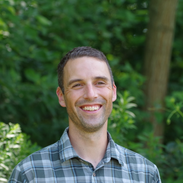
Dr. Greg Mitchell is a Research Scientist with the Wildlife Research Division of the Science and Technology Branch of Environment and Climate Change Canada. Dr. Mitchell is based out of the National Wildlife Research Centre in Ottawa, Ontario, Canada. Dr. Mitchell’s research program focuses on understanding the habitat needs of and the threats to Canada’s Species-at-Risk in human dominated ecosystems across southern Canada. Dr. Mitchell represents Canada on the Trinational Monarch Conservation Science Partnership - a trinational team at the federal level that works together to identify shared conservation research priorities across the three countries and share national approaches to country specific conservation challenges.
Moderator: Vanessa Charlwood, Acting Associate Regional Director General, West and North Region, Strategic Priorities Branch, Environment and Climate Change Canada

Vanessa is the Acting Associate Regional Director General, West and North Region, Strategic Priorities Branch, Environment and Climate Change Canada (ECCC). Vanessa has 21 years of service with ECCC within the Canadian Wildlife Service, most recently as the Regional Director for the Prairie Region (Alberta, Saskatchewan and Manitoba) where she had responsibilities for the conservation of migratory birds, species at risk and habitat and also served as the chair of the Prairie Habitat Joint Venture and a member of the North American Waterfowl Management Plan Committee.
Loading...
|
ASSOCIATION OF FISH & WILDLIFE AGENCIES
1100 First Street NE, Suite 825 Washington, DC 20002 (202) 838-3474 [email protected] |
© Association of Fish and Wildlife Agencies | Website Photos Courtesy of Meeting Hosts | Website Management by Delaney Event Management
